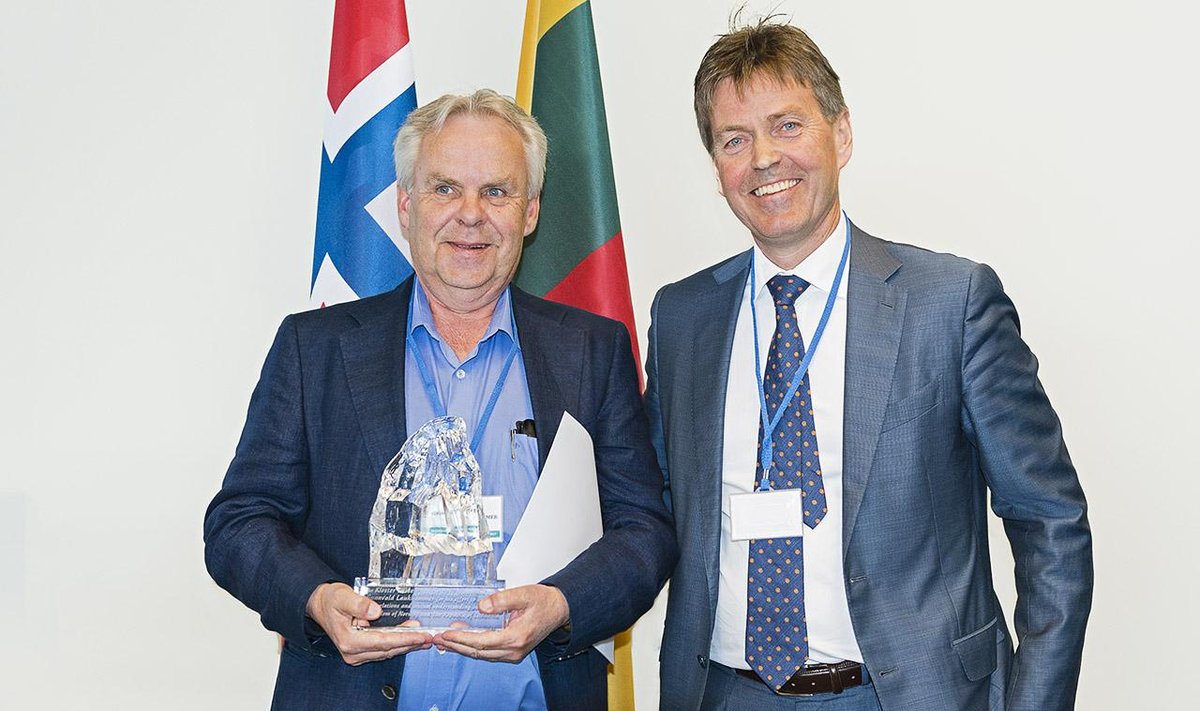Lina Mockutė, welcomed about 100 attendants to the annual Norwegian-Lithuanian Business Forum, an annual Chamber event in the appropriate Nordic looking and feeling setting of the newly constructed Quadrum building in Vilnius.
The event started with opening remarks by the Norwegian Ambassador to Lithuania, Dag Halvorsen, who spoke about Norwegian values. He described how stability and the effective uses of tripartite to strengthen a stable labour environment, strong solidarity, teamwork, and trust are elements that have contributed to Norway's success.
Stig Myrseth, CEO and Investment Director of Dovre Fornvaltning, gave an overview of the political and economic situation in Lithuania and the surrounding area. Mr. Myrseth believes that we will see a rollback of sanctions against Russia by year's end as cracks are appearing, particularly in Italy and France, as the high costs are putting pressure on governments in several countries. He saw the issue of migration as a continuation of the 'blame game' fuelling the populist agenda in Europe and elsewhere.
The importance of keeping the sanctions, and keeping pressure on Russia, in face of the military threats against Europe was the main message of opposition MP and former Lithuanian Minister of Defence, Rasa Juknevičienė. She thanked the Norwegians for contributing to the NATO presence in Rukla and that the military alliance's strength forms the backbone to deter further Russia aggression.
Nothing could contrast more than moving on from geopolitical strategic issues to management structures than those of the next speaker, Dr Ralf Müller. A professor of Project Management at the BI Nordic School, Dr. Müller illustrated how the need for particular psychological skill sets can vary when teams work in a variety of settings and objectives.
Jaime Izquierdo Pereira, the founder of Competencias 2.0, gave an interactive look inside the world of digital communication. In an entertaining way, Mr. Izquierdo Pereira provided a useful list of do's and don'ts on various forms of social networks. Especially, such networks as LinkedIn, which can contribute to more and better business. He got the attendants all excited with an interactive educational game. The winner, Dr Inga Minelgaitė Snaebjornsson, was also the next speaker.
Iceland based, Dr Inga Minelgaitė Snaebjornsson, a researcher and lecturer at School of Business, University of Iceland and her colleague Dr Olga Štangej gave an overview of typical Norwegian management techniques that they believe can be used in a Lithuanian environment. Their accent was on the need set of Millennials and how they provide opportunities and challenges for employers.
The practical aspects of how some of these Nordic and Norwegian management theories and ideas can be transferred into a Lithuanian reality were illustrated by two experienced Norwegian managers. DBN's President and Chairman of the Board, Bjørnar Lund and the Managing Director of SuperOffice in Vilnius, Stein Ove Sektnan have many years of experience working in Lithuania. They gave their views of particular issues working with Lithuanian staff, as well as insights of how they evolved over the last years. The element of trust came up often and how some remnants of Lithuania's past affect both management and behaviour in the workplace.
The event ended on a festive note when DBN's Bjørnar Lund gave the annual Kloster Lasse award to Mr. Gunnvar Laukhammer. Mr. Laukhammer is a Norwegian entrepreneur of shipping interiors furniture. He established Lido Marine in Klaipeda in 2002 tapping into the long-time local experience in ship building and outfitting. The company has expanded since, also buying a related business in Kretinga in 2006. With a staff of about 100, the company operates teams in several locations around the world. Mr. Laukhammer is also a well-know local philanthropist. The Kloster Lasse price is named after the first Norwegian said to have arrived in Lithuania in the 17th Century.
